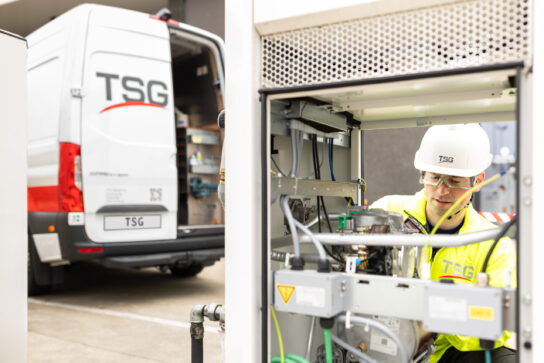With the advance in natural gas, hydrogen and electric vehicle technology and the government’s sharp focus on net-zero, many speculate that the dependable diesel engine is being phased out. However, given the fact that as yet, these emerging energies are still a relatively new concept for bigger and heavier vehicles, it is likely that diesel fuel will have a vital role to play in modern business fleets for many years to come.
In an effort to mitigate the harmful effects of diesel exhaust fumes, the European Commission imposed regulations that stipulated all diesel vehicles built from 2015 onwards must be compliant with the Euro 6 emission standard, which centres on restricting the production of nitrogen oxides (NOx) and particulate matter from the exhaust system; AdBlue® plays a simple but critical part in this process.
For many UK companies, the use of AdBlue® is a legal requirement when running heavy goods vehicles (HGVs) powered by diesel fuel. But what is AdBlue®, how does it reduce greenhouse gas emissions, and what happens if it runs out? This article addresses these points and provides a clear insight into the contribution made by AdBlue® in the fight against climate change.

What is AdBlue®
AdBlue® is the trading name given to diesel exhaust fluid (DEF) and comprises one-third aqueous urea solution and two-thirds deionised water. Whilst AdBlue® is non-hazardous, non-toxic and non-flammable, it is corrosive and should always be stored in corrosion-proof containers out of direct sunlight. Keeping AdBlue® safe from contaminants will help to maintain its quality, prevent product degradation and avoid any damage to the vehicle’s engine during use.
Contrary to popular belief, the urea in AdBlue® is not a by-product of animal urine but instead is made from ammonium cyanite, a substance that when heated forms colourless crystalline urea that is completely synthetic.

How does it work?
AdBlue® is injected into the catalyst of an advanced active emissions control technology system, known as selective catalytic reduction (SCR). The high temperatures of the exhaust gases cause the AdBlue® to vapourise into its two constituent components – ammonia and carbon dioxide. Inside the SCR, the ammonia is blended with the exhaust fumes, provoking a chemical reaction that converts nitrogen oxides (NOx) into nitrogen, water and a small amount of carbon dioxide (CO2). As a result, the gases emitted are less harmful to the environment and our health.

What are the consequences of running out of AdBlue®?
If the AdBlue® tank reaches empty, it is important for the driver to proceed (without shutting down the engine) to the next distribution point and to replenish the supply as soon as is practicable. That said, running out of AdBlue® is a somewhat rare occurrence, as a dashboard warning light will appear when the remaining tank range is approximately 1,000 miles. This warning will continue to flash at 31-mile (50 km) intervals and may be accompanied by an audible alarm. If these notifications are not acted upon, the vehicle will not restart once the ignition is turned off.
Whilst the engine will not be damaged in the absence of AdBlue®, its performance may be affected, as the power drops automatically to reduce the emissions in line with the legal limit, returning to normal when the AdBlue® tank is refilled.
How does AdBlue® contribute to the fight against climate change?
Leaders from around the world have committed to tackling climate change head-on and working towards a more sustainable future for us all. A fundamental element of this strategy is for fleet operators to make the transition to vehicles powered by greener alternatives such as; electricity, liquefied natural gas (LNG), compressed natural gas (CNG) and hydrogen.
However, whilst this trend will undoubtedly continue, it is important to recognise that complete energy transition could take many years, as the supporting refuelling/charging infrastructure struggles to keep pace with demand.
As a consequence, traditional fuels such as unleaded petrol and diesel will remain dominant on our roads for the foreseeable future. With this in mind, it is imperative these fuels continue to evolve, in order to minimise their impact on the environment. In the same way that the recent move from E5 to E10 petrol (containing more ethanol and less fossil fuel) goes some way to reducing carbon emissions, so too AdBlue® helps to transform toxic nitrogen oxides expelled from diesel engines into harmless nitrogen and water vapour.
AdBlue® is a simple but very effective solution that helps to reduce poisonous gases in our environment and plays a significant role in contributing to a cleaner, greener world.

How can TSG help fleet operators?
TSG UK is able to support businesses looking to participate in the transformation from traditional fossil fuels to new, greener fuelling solutions including EV, gas and hydrogen.
However, it will also continue to sustain the existing fleet fuelling networks, including the supply, installation and maintenance of a wide range of AdBlue® dispensers and container solutions to suit any size of fleet or usage requirements. From plastic intermediate bulk containers (IBCs) to integrated steel tank versions (twin compartment for diesel and AdBlue®) complete with dispensers. All of the TSG AdBlue® dispensing solutions are ISO 22241-compliant
For more information about TSG’s AdBlue services, please visit: AdBlue Solutions from TSG



